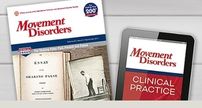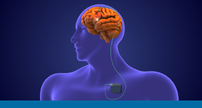
Course Listing
Advance your knowledge in engaging, interactive courses developed and taught by leaders in the field.
Browse All MDS Courses
New courses are added regularly. If there are not courses listed in the category you are searching, more will be scheduled at a later date. Check back soon or sign up for email notifications.
Journal CME 41.01: Cerebrospinal Fluid Proenkephalin Predicts Striatal Atrophy Decades before Clinical Motor Diagnosis in Huntington's Disease
On Demand
Journal CME
60 Minutes
Experienced / Intermediate
1074 <p>The Journal CME 41.01 article aims to investigate cross-sectional and longitudinal associations between baseline cerebrospinal fluid (CSF) PENK concentration and regional brain atrophy, compared identified patterns with CSF neurofilament light (NfL), and evaluated PENK and NfL for discriminating between HD Integrated Staging System (HD-ISS) stage 0 versus 1 in a far-from-onset HD gene-expanded (HDGE) cohort.</p> Biomarkers, Biomarkers & Diagnostic Tools, Chorea/Huntingtons Disease (HD), Hyperkinetic Movement Disorders Mena Farag, MBBS, MRCP 60 1.00 https://education.movementdisorders.org/Detail/1074/Journal-CME-41-01:-Cerebrospinal-Fluid-Proenkephalin-Predicts-Striatal-Atrophy-Decades-before-Clinical-Motor-Diagnosis-in-Huntington's-Disease https://education.movementdisorders.org/Upload/ActivityImages/Journal-CME562837664663.jpg 2026-02-11T00:00:00 2027-02-11T00:00:00 <p><strong>ACCREDITATION STATEMENT</strong></p><p>This activity has been planned and implemented in accordance with the accreditation requirements and policies of the Accreditation Council for Continuing Medical Education (ACCME). The International Parkinson and Movement Disorder Society is accredited by the ACCME to provide continuing medical education for physicians.</p><p><br></p><p><strong>CREDIT DESIGNATION STATEMENT</strong></p><p>The International Parkinson and Movement Disorder Society designates this activity for a maximum of 1 <em>AMA PRA Category 1 Credits™</em>. Physicians should only claim credit commensurate with the extent of their participation.</p><p><br></p><p><strong>FACULTY DISCLOSURE</strong></p><p>All individuals in control of content for this activity are required to disclose all financial relationships with ineligible companies (as defined by the ACCME) over the last 24 months. Disclosure information is available <a href="https://d1t84l7yt030ad.cloudfront.net/FroalaFiles/Journal%20CME%2041.01%20-%20Disclosures_06022026033938.pdf" rel="noopener noreferrer" target="_blank"><u>HERE</u></a>. All relevant financial relationships have been mitigated in advance of this program.</p><p><br></p><p><strong>METHOD OF PARTICIPATION</strong></p><p>Each module will take approximately one (1) hour to complete. Upon reading the article, participants will take a post-test and must receive a grade of 75% or higher to pass. Participants are allowed multiple attempts to complete the post-test. Once the post-test is passed, participants are required to complete the module evaluation.</p><p><br></p><p><strong>SATISFACTORY COMPLETION</strong></p><p>Participants must complete an evaluation for each session they attend to receive continuing medical education credit. Your chosen session(s) must be attended in their entirety. Partial credit for individual sessions is not available.</p><p><br></p><p><strong>CONTENT VALIDITY STATEMENT</strong></p><p>All recommendations involving clinical medicine in MDS activities are based on evidence that is accepted within the profession of medicine as adequate justification for their indications and contraindications in the case of patients. All scientific research referred to, reported or used in CME in support or justification of a patient care recommendations conforms to the generally accepted standards of experimental design, data collection and analysis. Activities that promote recommendations, treatment or manners of practicing medicine not within the definition of CME or are knowing to have risks or dangers that outweigh the benefits or are knowing to be ineffective in the treatment of patients do not constitute valid CME.</p> MDS Education <p><strong>COURSE PURPOSE</strong></p><p>Journal CME highlights various articles covering relevant issues, developments and research topics in the area of movement disorders. Articles are selected from Movement Disorders, the official Journal of the International Parkinson and Movement Disorder Society.</p><p><br></p><p><strong>LEARNING OBJECTIVES</strong></p><p>Upon completion of this activity, learners will be able to:</p><p>1. Understand the biological rationale for CSF proenkephalin as a striatum-specific biomarker in Huntington’s disease<br>2. Assess associations between baseline CSF PENK and longitudinal regional brain atrophy compared with neurofilament light<br>3. Evaluate the role of CSF PENK in distinguishing early HD-ISS stages and its potential value for clinical trial enrichment<br><br></p><p><strong>INTENDED AUDIENCE</strong></p><p>This activity is intended for clinicians, other health professionals, researchers, policy makers from throughout the world, both MDS members and non-members, who interact with patients living with Movement Disorders.</p><p><br></p><p><strong>HARDWARE AND SOFTWARE REQUIREMENTS</strong></p><p>1. Active Internet connection (DSL or Cable). Dial-up connection will have constant buffering problem.</p><p>2. Compatible with Windows PC and MAC (256 MB of RAM or higher).</p><p>3. Activity is best viewed on Internet Explorer 9.0 or higher, Safari 5.0 or higher and Firefox 29.0 or higher.</p><p>4. Adobe Flash Player 12.0 (or higher).</p><p>5. Adobe Reader to print certificate.</p> 0 /Courses/Journal-CME-41.01-Cerebrospinal-Fluid-Proenkephalin-Predicts-Striatal-Atrophy-Decades-before-Clinical-Motor-Diagnosis-in-Huntingtons-Disease.htm Journal CME 41.01: Cerebrospinal Fluid Proenkephalin Predicts Striatal Atrophy Decades before Clinical Motor Diagnosis in Huntington's Disease Journal CME 41.01 2026-02-11T12:01:11.930 0 0 Experienced / Intermediate Clinician Fellow Industry Researcher Resident Journal CME CME English On-Demand USA
Tremor from Basic Science to Clinical Diagnosis and Therapy
In-PersonEurope
Salerno, Italy
Sep 18, 2026 - Sep 19, 2026
Experienced / Intermediate
1073 During the <em>MDS-ES Tremor from Basic Science to Clinical Diagnosis and Therapy</em> course, evidence based results and speakers’ experiences will be reviewed from the basic science and clinical points of view and will incorporate talks about newer perspective on tremor measurement with digital/AI assisted tools. Moreover, therapeutic options will be reviewed in depth, from pharmacological treatments to surgical procedures (including DBS and MRgFUS) to alternative options. Two interactive video-case sessions will be included to precipitate further discussion. Basic/Translational Neuroscience, Biomarkers, Biomarkers & Diagnostic Tools, Botulinum toxin, Clinical Trials, Deep brain stimulation, Dopaminergic medications, Etiology & Pathophysiology, Focused Ultrasound, Gene Therapies, Genetics, Hyperkinetic Movement Disorders, Infusion therapy, Medications for motor complications, Medications for motor symptoms, Medications for non-motor symptoms, Neuroimaging, Neuropathology, Rating Scales, Therapies-Pharmacological, Therapies-Surgical, Tremor/Essential Tremor (ET) 750 0.00 https://education.movementdisorders.org/Detail/1073/MDS-ES-Tremor-from-Basic-Science-to-Clinical-Diagnosis-and-Therapy https://education.movementdisorders.org/Upload/ActivityImages/26ESBASIC_202x108890630.png https://education.movementdisorders.org/Upload/BannerImages/26ESBASIC_734x404532438.jpeg 2026-09-18T00:00:00 2026-09-19T00:00:00 Salerno <p><br></p><p><br></p> MDS Education <p><a href="https://d1t84l7yt030ad.cloudfront.net/FroalaFiles/26ESBASIC Course Schedule_no faculty_05022026122550.pdf" rel="noopener noreferrer" target="_blank"><img src="https://s3-us-east-2.amazonaws.com/mds-lms/FroalaFiles/Course schedule_23012024043738.png" style="width: 125px; height: 125px;" class="fr-fic fr-dib"></a><strong>Course Schedule</strong><strong> </strong><a href="https://d1t84l7yt030ad.cloudfront.net/FroalaFiles/Faculty Listing_LMS_CDs_05022026123017.pdf" rel="noopener noreferrer" target="_blank"><img src="https://s3-us-east-2.amazonaws.com/mds-lms/FroalaFiles/Faculty Details_23012024043924.png" style="width: 125px; height: 125px;" class="fr-fic fr-dib"></a><strong>Course Faculty</strong></p><p><br></p><p><em>Schedule as of February 5, 2026 </em></p><p><strong><em><span style="color: rgb(184, 49, 47);">Application Deadline:</span> </em></strong><em> July 1, 2026</em></p><p><br></p><p><strong>REGISTRATION FEES</strong><br><strong>Members:</strong> $275 USD<br><strong>Members</strong><strong>: Junior / HP / Basic Science / No Fee:</strong> $250 USD<br><strong>Non-Members*:</strong> $325 USD</p><p>*<em>Non-members wishing to apply for MDS Membership to receive the MDS Member rate for this course will need to apply for membership no later than 2 weeks in advance of the close of registration.</em><br><br></p><p><a href="https://s3-us-east-2.amazonaws.com/mds-lms/FroalaFiles/VISA%20STATEMENT%20CANCELLATION%20LANGUAGE_24012024041714.pdf" rel="noopener noreferrer" target="_blank">Click here to view the MDS Regional Course Cancellation Policy & Visa Assistance Information</a></p><p><br></p><p><strong>SCHEDULE OVERVIEW</strong><br>Day 1: Friday, September 18, 2026 from 13:00 - 20:00<br>Day 2: Saturday, September 19, 2026 from 9:00 - 16:30<br><br><strong>COURSE VENUE</strong></p><p>Fondazione EBRIS, Salerno, Italy</p><p><br></p><p><strong>LEARNING OBJECTIVES</strong></p><p>Upon completion of this activity, learners will be able to: </p><p>1. Demonstrate how to assess tremor during patient examination</p><p>2. Associate and interpret outcomes from different sources of tremor assessment (clinical scales, electrophysiology, digital tools) </p><p>3. Plan treatment strategies for tremor syndromes (including pharmacological and surgical options) </p><p><br></p><p><strong>INTENDED AUDIENCE</strong></p><p>This activity is intended for neurologists, neurosurgeons, neuroscientists and general practitioners interested in tremor.</p> Salerno 0 /Courses/Tremor-from-Basic-Science-to-Clinical-Diagnosis-and-Therapy.htm Tremor from Basic Science to Clinical Diagnosis and Therapy 2026-02-09T12:01:07.030 0 0 Experienced / Intermediate Clinician Clinician-Movement Disorder Specialist Fellow-Movement Disorders Researcher-Clinical Resident-Neurology English Europe In-Person Italy
School for Young Neurologists
In-PersonAfrica
Cairo Governorate, Egypt
May 01, 2026 - May 02, 2026
Foundational / Beginner
1068 <p>The MDS-African Section School for Young Neurologists is an opportunity for young neurologists who are interested in specializing in Movement Disorders to receive in-depth instruction from internationally recognized Movement Disorders experts. Students will attend lectures and panel discussions with question-and-answer sessions, will have the opportunity to examine patients with movement disorders, and engage in a differential diagnosis with the international experts.</p><p> </p><p style="text-align:center;"><strong>APPLICATION/BURSARY DEADLINE:</strong> February 20, 2026</p> Biomarkers, Biomarkers & Diagnostic Tools, Botulinum toxin, Clinical Trials, Deep brain stimulation, Dopaminergic medications, Focused Ultrasound, Gene Therapies, Genetics, Infusion therapy, Medications for motor complications, Medications for motor symptoms, Medications for non-motor symptoms, Neuroimaging, Neuropathology, Rating Scales, Therapies-Pharmacological, Therapies-Surgical 1320 0.00 https://education.movementdisorders.org/Detail/1068/MDS-AS-School-for-Young-Neurologists https://education.movementdisorders.org/Upload/ActivityImages/26AFRSYN_202x108244151.png 2026-05-01T00:00:00 2026-05-02T00:00:00 Hilton Cairo Heliopolis, Cairo Governorate MDS Education <p><strong><a href="https://d1t84l7yt030ad.cloudfront.net/FroalaFiles/LMS Prelim Agenda - 26AFRSYN School for Young Neurologists_09022026103407.pdf" rel="noopener noreferrer" target="_blank"><img src="https://d1t84l7yt030ad.cloudfront.net/FroalaFiles/Course schedule_13052025105320.png" style="width: 125px; height: 125px;" class="fr-fic fr-dib"></a></strong><a href="https://d1t84l7yt030ad.cloudfront.net/FroalaFiles/LMS Prelim Agenda - 26AFRSYN School for Young Neurologists_09022026103407.pdf" rel="noopener noreferrer" target="_blank"> <strong>Course Schedule</strong></a><strong> </strong> <a href="https://d1t84l7yt030ad.cloudfront.net/FroalaFiles/26AFRSYN Faculty Listing - NO FACULTY_09022026104631.pdf" rel="noopener noreferrer" target="_blank"><img src="https://s3-us-east-2.amazonaws.com/mds-lms/FroalaFiles/Faculty Details_23012024043924.png" style="width: 125px; height: 125px;" class="fr-fic fr-dib"></a><a href="https://d1t84l7yt030ad.cloudfront.net/FroalaFiles/26AFRSYN Faculty Listing - NO FACULTY_09022026104631.pdf" rel="noopener noreferrer" target="_blank"><strong>Course Faculty</strong></a></p><p><br></p><p><em>Schedule as of January 27, 2026</em></p><p><strong><em><span style="color: rgb(175, 38, 38);">Application/Travel Bursary Deadline:</span> February 20, 2026</em></strong></p><p><br></p><p><strong>REGISTRATION FEES</strong><br><strong>Members:</strong> $25 USD<br><strong>Non-Members*:</strong> $150 USD</p><p>*<em>Non-members wishing to apply for MDS Membership to receive the MDS Member rate for this course will need to apply for membership no later than 2 weeks in advance of the close of registration.</em></p><p><a href="https://s3-us-east-2.amazonaws.com/mds-lms/FroalaFiles/VISA%20STATEMENT%20CANCELLATION%20LANGUAGE_24012024041714.pdf">Click here to view the MDS Regional Course Cancellation Policy & Visa Assistance Information</a></p><p><br></p><p><strong>LEARNING OBJECTIVES</strong></p><p>Upon completion of this activity, learners will be able to: </p><ol><li>Recognize the clinical characteristics of different types of movement disorders in both adults and children.</li><li>Perform a comprehensive assessment, including history taking and neurological examination, of patients with movement disorders.</li><li>Identify the various etiologies underlying different types of movement disorders.</li><li>Recognize best practices in the management of movement disorders, including advanced therapies.</li><li>Develop a structured approach to the use of botulinum toxin for the treatment of dystonia and other movement disorders.</li><li>Recognize challenges in the management of patients with movement disorders in Africa and tailor treatment strategies to individual patient needs.</li></ol><p><br></p><p><strong>INTENDED AUDIENCE</strong></p><p>The MDS-AS School for Young Neurologists is intended for young neurologists within five years of their completion of general neurological training who are interested in specializing in movement disorders, and young neurologists who are already training in movement disorders.</p> Cairo Governorate 0 /Courses/School-for-Young-Neurologists2.htm School for Young Neurologists 2026-02-05T15:01:06.970 0 0 Foundational / Beginner Clinician-General Neurologist Clinician-Movement Disorder Specialist Fellow-Clinical Fellow-Movement Disorders Resident-Neurology Africa In-Person Egypt
11th Annual Movement Disorders School for Neurology Residents
In-PersonPan America
Boston, USA
Sep 12, 2026 - Sep 13, 2026
Foundational / Beginner
1066 <p>Led by internationally recognized movement disorder experts, the International Parkinson and Movement Disorder Society's Pan American Section (MDS-PAS) 11th Annual Movement Disorders School for Neurology Residents offers a broad education on movement disorders, the latest research and potential career paths in the field. The goal of the course is to provide in-depth education on movement disorders and encourage neurology residents to consider specializing in the field.<br /><strong></strong><strong></strong><strong></strong></p> Ataxias, Biomarkers, Biomarkers & Diagnostic Tools, Chorea/Huntingtons Disease (HD), Corticobasal Syndrome (CBS)/Corticobasal Degeneration (CBD), Drug-induced Movement Disorders/Tardive dyskinesia, Dystonia, Freezing of Gait (FOG), Functional Movement Disorders, Gait & Balance Disorders, Genetic & Hereditary Disorders, Genetics, Hyperkinetic Movement Disorders, Lewy-body dementia (LBD), Movement Disorders Emergencies, Multiple Systems Atrophy (MSA), Myoclonus, Neuroimaging, Neuropathology, Other Movement Disorders, Parkinson Disease/Hypokinetic Movement Disorders, Parkinson's Disease (PD), Progressive Supranuclear Palsy (PSP), Rare/Uncommon Movement Disorders, Rating Scales, Restless Legs Syndrome (RLS)/Periodic Limb Movement Disorder (PLMD), Stiff Person syndrome (SPS), Tics/Tourettes syndrome (TS), Tremor/Essential Tremor (ET) 840 0.00 https://education.movementdisorders.org/Detail/1066/MDS-PAS-11th-Annual-Movement-Disorders-School-for-Neurology-Residents https://education.movementdisorders.org/Upload/ActivityImages/24PASSNR_202x108212056.png https://education.movementdisorders.org/Upload/BannerImages/26PASSNR_734x404275597.jpeg 2026-09-12T00:00:00 2026-09-13T00:00:00 Renaissance Boston Seaport District, Boston, Massachusetts <p><br></p><p><br></p> <p>This program is made possible with support from the The Michael J. Fox Foundation for Parkinson’s Research.</p><p><img src="https://education.movementdisorders.org/Upload/SupportImages/21SNR-mjff-logo530882.jpg" alt="" class="fr-fic fr-dii"></p><p>And their generous giving partners:<br><br><img data-fr-image-pasted="true" src="https://education.movementdisorders.org/Upload/SponsorImages/21SNR-Edmond-J.-Safra-Foundation-Logo694865.png" alt="" class="fr-fic fr-dii"><br><br></p><p><em>While our generous sponsors make our educational offering possible, their support does not influence content, perspective, or panelist selections.</em></p> MDS Education <p><a href="https://d1t84l7yt030ad.cloudfront.net/FroalaFiles/26PASSNR Course Schedule_No faculty_04022026102227.pdf" rel="noopener noreferrer" target="_blank"><img src="https://s3-us-east-2.amazonaws.com/mds-lms/FroalaFiles/Course schedule_23012024043738.png" style="width: 125px; height: 125px;" class="fr-fic fr-dib"></a><strong>Course Schedule</strong><strong> </strong><a href="https://d1t84l7yt030ad.cloudfront.net/FroalaFiles/Faculty Listing_LMS_CDs_29012026115320.pdf" rel="noopener noreferrer" target="_blank"><img src="https://s3-us-east-2.amazonaws.com/mds-lms/FroalaFiles/Faculty Details_23012024043924.png" style="width: 125px; height: 125px;" class="fr-fic fr-dib"></a><strong>Course Faculty</strong></p><p><br></p><p><em>Schedule as of February 2, 2026 </em><br><br><strong><em><span style="color: rgb(175, 38, 38);">Course Application</span><span style="color: rgb(184, 49, 47);"> Deadline: </span></em></strong><em><span style="color: rgb(184, 49, 47);">August 1, 2026</span></em></p><p><br><strong>SCHEDULE OVERVIEW</strong><br>Day 1: Saturday, September 12, 2026 from 8:00 - 20:00<br>Day 2: Sunday, September 13, 2026 from 8:00 - 13:00<br><br><span style="background-color: null;"><strong>COURSE VENUE</strong></span></p><p>Renaissance Boston Seaport District<br>606 Congress Street, Boston, MA, 02210 </p><p><br></p><p><strong>LEARNING OBJECTIVES</strong></p><p>Upon completion of this activity, learners will be able to:</p><p><span style="color:#000000;">1. Examine a patient with a movement disorder</span></p><p><span style="color:#000000;">2. Reach a diagnosis on straightforward movement disorders cases</span></p><p><span style="color:#000000;">3. Propose a differential diagnosis on more complex movement disorders patients</span></p><p><span style="color:#000000;">4. Present a movement disorders case history</span></p><p><span style="color:#000000;">5. Design, review and modify a patient treatment plan</span></p><p><br></p><p><strong>INTENDED AUDIENCE</strong></p><p>This activity is intended for <span style="color:#1f1f1f;">General neurology residents (f</span>irst-year interns, second-year and third-year) who are undecided in a sub-specialty and would like to learn about movement disorders.</p> Boston 0 /Courses/11th-Annual-Movement-Disorders-School-for-Neurology-Residents.htm 11th Annual Movement Disorders School for Neurology Residents 2026-02-03T12:01:09.140 0 0 Foundational / Beginner Resident Resident-Neurology Resident-Other English Pan America In-Person USA
School for Device Aided Therapies in Parkinson’s Disease
In-PersonAsia / Oceania
Bangkok, Thailand
May 06, 2026 - May 07, 2026
Experienced / Intermediate
1070 <p>The <em>MDS-AOS School for Device Aided Therapies in Parkinson’s Disease</em> aims to cultivate the next generation of experts in DBS and infusion therapy for PD, providing them with a comprehensive overview, case-based discussion and hands-on workshop in DBS and infusion therapy in PD. This year's school will start with the basics and then discuss recent updates of DBS and infusion therapy in PD.<br /><br /><span style="color:#990000;"><strong>REGISTRATION DEADLINE: April 22, 2026</strong></span><strong></strong><strong></strong></p> Clinical Trials, Deep brain stimulation, Focused Ultrasound, Gene Therapies, Infusion therapy, Parkinson Disease/Hypokinetic Movement Disorders, Parkinson's Disease (PD), Therapies-Surgical 690 0.00 https://education.movementdisorders.org/Detail/1070/MDS-AOS-School-for-Device-Aided-Therapies-in-Parkinson’s-Disease https://education.movementdisorders.org/Upload/ActivityImages/26AOSNMOD_202x108589130.png 2026-05-06T00:00:00 2026-05-07T00:00:00 King Chulalongkorn Memorial Hospital, Bangkok <p><br></p><p><br></p> MDS Education <p><a href="https://d1t84l7yt030ad.cloudfront.net/FroalaFiles/26AOSNMOD Course Schedule_no faculty_10022026022546.pdf" rel="noopener noreferrer" target="_blank"><img src="https://s3-us-east-2.amazonaws.com/mds-lms/FroalaFiles/Course schedule_23012024043738.png" style="width: 125px; height: 125px;" class="fr-fic fr-dib"></a><strong>Course Schedule </strong><a href="https://form.jotform.com/260276276503154" rel="noopener noreferrer" target="_blank"><img src="https://s3-us-east-2.amazonaws.com/mds-lms/FroalaFiles/Travel assistance_23012024043912.png" style="width: 125px; height: 125px;" class="fr-fic fr-dib"></a><strong>Travel Bursary </strong><a href="https://d1t84l7yt030ad.cloudfront.net/FroalaFiles/Faculty Listing_LMS_CDs_11022026033320.pdf" rel="noopener noreferrer" target="_blank"><img src="https://s3-us-east-2.amazonaws.com/mds-lms/FroalaFiles/Faculty Details_23012024043924.png" style="width: 125px; height: 125px;" class="fr-fic fr-dib"></a><strong>Course Faculty</strong></p><p><br></p><p><em>Schedule as of February 10, 2026 </em></p><p><strong><em><span style="color: rgb(175, 38, 38);">Travel Bursary Deadline:</span> </em></strong><em>February 27, 2026</em><br><br></p><p><strong>REGISTRATION FEES</strong><br><strong>Members: </strong>$200 USD<br><strong>Junior & No-Fee Members: </strong>$150 USD<br><strong>Non-Members: </strong>$200 USD</p><p>*<em>Non-members wishing to apply for MDS Membership to receive the MDS Member rate for this course will need to apply for membership no later than 2 weeks in advance of the close of registration.</em></p><p><a href="https://s3-us-east-2.amazonaws.com/mds-lms/FroalaFiles/VISA%20STATEMENT%20CANCELLATION%20LANGUAGE_24012024041714.pdf">Click here to view the MDS Regional Course Cancellation Policy & Visa Assistance Information</a></p><p><br></p><p><span style="background-color: null;"><strong>COURSE VENUE</strong></span></p><p>King Chulalongkorn Memorial Hospital</p><p>Bangkok, Thailand<br><br></p><p><strong>SCHEDULE OVERVIEW<em> </em></strong></p><p>Day 1: Wednesday, May 6, 2026 | 8:15 - 17:10<br>Day 2: Thursday, May 7, 2026 | 8:30 - 17:20</p><p><br></p><p><strong>LEARNING OBJECTIVES</strong></p><p>Upon completion of this activity, learners will be able to: </p><p>1. Develop the multi-disciplinary team for deep brain stimulation and infusion therapy</p><p>2. Classify the candidates of deep brain stimulation and infusion therapy</p><p>3. Compare the various targets for deep brain stimulation and choose the best target for subjects</p><p>4. Act initial programming and troubleshooting in patients with deep brain stimulation and those with infusion therapy</p><p>5. Act with deep brain stimulation programmer and infusion pump during hands-on workshops</p><p>6. Establish a local and international network of young clinicians and researchers, fostering collaborations and facilitating future research in the field of deep brain stimulation</p><p><br></p><p><strong>INTENDED AUDIENCE</strong></p><p>The target audience is clinicians, movement disorder specialists, fellows, neurology residents, clinical researchers, and clinical nurse specialists.<br><br></p> Bangkok 0 /Courses/School-for-Deep-Brain-Stimulation-and-Infusion-Therapy-in-Parkinsons-Disease.htm School for Device Aided Therapies in Parkinson’s Disease 2026-01-29T12:01:06.523 0 0 Experienced / Intermediate Clinician Clinician-Movement Disorder Specialist Fellow Fellow-Clinical Fellow-Movement Disorders Health Professional-Clinical Nurse Specialist Researcher-Clinical Resident-Neurology English Asia / Oceania In-Person Thailand
TWSTRS: Toronto-Western Spasmodic Torticollis Rating Scale Training
On Demand
COA / Rating Scale Trainings
90 Minutes
920 <p>The video demonstrates the 10 categories in the TWSTRS scale, with verbal and visual examples of scoring in each category.</p><br /><p>Comella, C.L., Stebbins, G.T., Goetz, C.G., Chmura, T.A., Bressman, S.B. and Lang, A.E. (1997), Teaching tape for the motor section of the toronto western spasmodic torticollis scale. Mov. Disord., 12: 570-575. <a href="https://doi.org/10.1002/mds.870120414 " target="_blank">https://doi.org/10.1002/mds.870120414 </a><br /></p> Biomarkers & Diagnostic Tools, Dystonia, Hyperkinetic Movement Disorders, Rating Scales C.L. Comella 90 0.00 https://education.movementdisorders.org/Detail/920/TWSTRS:-Toronto-Western-Spasmodic-Torticollis-Rating-Scale-Training https://education.movementdisorders.org/Upload/ActivityImages/COA-training-LMS699655.jpg 2022-12-31T00:00:00 2028-12-31T00:00:00 <p>1. Active Internet connection (DSL or Cable). Dial-up connection will have constant buffering problem.<br>2. Compatible with Windows PC and MAC (256 MB of RAM or higher)<br>3. Activity is best viewed on Internet Explorer 9.0 or higher, Safari 5.0 or higher and Firefox 29.0 or higher<br>4. Adobe Flash Player 12.0 (or higher).<br>5. Adobe Reader to print certificate.</p> <p><strong>Faculty</strong></p><p>Cynthia L. Comella, MD - Rush University Medical Center, Chicago, IL, USA</p><p>Glenn T. Stebbins, PhD - Rush University Medical Center, Chicago, IL, USA</p><p>Teresa A. Chmura, BS - Rush University Medical Center, Chicago, IL, USA</p><p>Christopher G. Goetz, MD - Rush University Medical Center, Chicago, IL, USA</p><p>Susan B. Bressman, MD - Icahn School of Medicine at Mount Sinai, New York, NY, USA</p><p>Anthony E. Lang, MD, FRCPC - Toronto Western Hospital, Toronto, ON, Canada</p> MDS Clinical Outcome Assessments Program 0 /Courses/TWSTRS-Toronto-Western-Spasmodic-Torticollis-Rating-Scale-Training.htm TWSTRS: Toronto-Western Spasmodic Torticollis Rating Scale Training 2026-01-21T15:00:50.013 0 0 COA / Rating Scale Trainings COA Certificate English On-Demand USA
Clinical Approach to Movement Disorders: Case-Based Video Rounds
Live OnlineEurope
Feb 24, 2026 - Mar 24, 2026
Foundational / Beginner
1067 The <em>MDS-ES Clinical Approach to Movement Disorders: Case-Based Video Rounds</em> is case-based course (3 sessions, 1.5-hour each) designed as an interactive video-round format focusing on the clinical evaluation of movement disorders. Each session's discussion will be moderated by MDS experts along with experts from the MDS Affiliate societies, who will guide the analysis, highlight key clinical features, and place the cases into a practical diagnostic and management framework. A total of three cases will be presented per session with cases selected through an open call for video submissions from clinicians across Europe, ensuring a broad representation of phenotypes and clinical challenges. Biomarkers, Biomarkers & Diagnostic Tools, Chorea/Huntingtons Disease (HD), Corticobasal Syndrome (CBS)/Corticobasal Degeneration (CBD), Dystonia, Freezing of Gait (FOG), Genetics, Hyperkinetic Movement Disorders, Lewy-body dementia (LBD), Multiple Systems Atrophy (MSA), Myoclonus, Neuroimaging, Neuropathology, Parkinson Disease/Hypokinetic Movement Disorders, Parkinson's Disease (PD), Progressive Supranuclear Palsy (PSP), Rating Scales, Tics/Tourettes syndrome (TS), Tremor/Essential Tremor (ET) 90 0.00 https://education.movementdisorders.org/Detail/1067/MDS-ES-Clinical-Approach-to-Movement-Disorders:-Case-Based-Video-Rounds https://education.movementdisorders.org/Upload/ActivityImages/26ESSERIE_202x108154226.png https://education.movementdisorders.org/Upload/BannerImages/26ESSERIE_734x404168944.jpeg 2026-02-24T00:00:00 2026-03-24T00:00:00 MDS Education <p><a href="https://d1t84l7yt030ad.cloudfront.net/FroalaFiles/26ESSERIES Series Schedule_12012026034216.pdf" rel="noopener noreferrer" target="_blank"><img src="https://s3-us-east-2.amazonaws.com/mds-lms/FroalaFiles/1733945513728_11122024013152.png" class="fr-fic fr-dii" style="width: 125px; height: 125px;"></a><strong>Course Schedule </strong><strong> </strong> <a href="https://d1t84l7yt030ad.cloudfront.net/FroalaFiles/Faculty Listing_LMS_CDs_16012026093007.pdf" rel="noopener noreferrer" target="_blank"><img src="https://s3-us-east-2.amazonaws.com/mds-lms/FroalaFiles/1733945513883_11122024013153.png" class="fr-fic fr-dii" style="width: 125px; height: 125px;"></a><strong>Course Faculty</strong><strong> </strong></p><p><span style="color: rgb(184, 49, 47);"><br></span></p><p><strong>REGISTRATION FEES</strong><br><strong>Members & Non-Members: </strong>$0 USD</p><p><br></p><p><strong>COURSE SCHEDULE</strong><strong><em> </em></strong></p><p>Tuesday, February 24, 2026 | 17:00 - 18:30 CET</p><p>Tuesday, March 10, 2026 | 17:00 - 18:30 CET</p><p>Tuesday, March 24, 2026 | 17:00 - 18:30 CET</p><p><br></p><p><strong>LEARNING OBJECTIVES</strong></p><p>Upon completion of this activity, learners will be able to: </p><p>1. Identify and describe the key phenomenological features of common and selected uncommon movement disorders using video-based clinical observation</p><p>2. Compare and associate observed movement disorder features with the most relevant differential diagnoses in a structured clinical framework</p><p>3. Demonstrate a stepwise, practical approach to evaluating video cases of movement disorders prior to advanced diagnostic testing</p><p>4. Plan an initial diagnostic and referral strategy for patients with suspected movement disorders based on clinical findings and recognized red flags</p><p><br></p><p><strong>INTENDED AUDIENCE</strong></p><p>The target audience is young neurologists or neurologists interested in movement disorders, from all European countries, as well as members of affiliated movement disorder societies.<br><br><br></p> <p><strong>OPEN CALL FOR VIDEO CASE SUBMISSIONS</strong><br>Cases will be selected through an open call for video submissions from clinicians across Europe, ensuring a broad representation of phenotypes and clinical challenges. Registered participants are invited to submit a video case for consideration to be presented at one of the three series sessions. Up to three (3) video cases will be selected per session.<br><br><strong><span style="color: rgb(184, 49, 47);">Video Case Submission Deadline for S</span></strong><span style="color: rgb(184, 49, 47);"><strong>ession 1:</strong></span><strong><span style="color: rgb(184, 49, 47);"> February 1, 2026</span></strong><br><br><span style="color: rgb(0, 0, 0);">Submissions will be reviewed on a rolling basis, with notifications sent to those selected 7-10 days before the session.</span><br><br><span style="color: rgb(0, 0, 0);"><strong>Video Case Submission Deadline for Session 2: </strong>February 15, 2026</span><br><span style="color: rgb(0, 0, 0);"><strong>Video Case Submission Deadline for Session 3:</strong> March 1, 2026</span><br><br><strong>GUIDELINES</strong><br>Video cases should be submitted via the Submission Form linked in the Registration Confirmation Email. All video case submissions should follow the guidelines outlined and use the template provided.<br><br><span style="color: rgb(0, 0, 0);"><strong>DISCUSSION FORMAT</strong><br>The discussion will be moderated by three MDS experts along with the invited experts from the three MDS Affiliate societies, who will guide the analysis, highlight key clinical features, and place the cases into a practical diagnostic and management framework. The course emphasizes bedside observation, phenomenology, and clinical reasoning rather than advanced investigations.</span><br><br><br></p> 0 /Courses/Clinical-Approach-to-Movement-Disorders-Case-Based-Video-Rounds.htm Clinical Approach to Movement Disorders: Case-Based Video Rounds 2026-01-13T12:01:07.073 0 0 Foundational / Beginner Clinician Clinician-General Neurologist Clinician-Movement Disorder Specialist Fellow Fellow-Clinical Fellow-Clinical Research Fellow-Movement Disorders Health Professional-Clinical Nurse Specialist Resident Resident-Neurology Student Student-Medical English Europe Live Online
A Comprehensive Review of Movement Disorders for the Clinical Practitioner
In-PersonPan America
Aspen, USA
Jul 26, 2026 - Jul 30, 2026
Foundational / Beginner
1063 <p>The Aspen Course is a unique opportunity for those early career movement disorders specialists, in particular Movement Disorders Fellows, to advance their knowledge and evaluate their careers through advice from advanced professionals in the field. The course program will discuss the classification of these disorders, their differential diagnosis, and their treatment, covering the phenomenology, pathophysiology, pathogenesis, epidemiology, genetics, and other aspects of the entire field of Movement Disorders. </p><p><em><strong>Space is limited; register early to avoid being placed on the waitlist.</strong></em><br /><br /><strong>REGISTRATION DEADLINE:<em> </em></strong>July 10, 2026</p><p><br /></p> Ataxias, Botulinum toxin, Chorea/Huntingtons Disease (HD), Clinical Trials, Corticobasal Syndrome (CBS)/Corticobasal Degeneration (CBD), Deep brain stimulation, Dopaminergic medications, Drug-induced Movement Disorders/Tardive dyskinesia, Dystonia, Freezing of Gait (FOG), Hyperkinetic Movement Disorders, Infusion therapy, Lewy-body dementia (LBD), Medications for motor complications, Medications for motor symptoms, Medications for non-motor symptoms, Multiple Systems Atrophy (MSA), Myoclonus, Other Movement Disorders, Parkinson Disease/Hypokinetic Movement Disorders, Parkinson's Disease (PD), Progressive Supranuclear Palsy (PSP), Therapies-Pharmacological, Therapies-Surgical, Tics/Tourettes syndrome (TS), Tremor/Essential Tremor (ET) 1305 18.75 https://education.movementdisorders.org/Detail/1063/A-Comprehensive-Review-of-Movement-Disorders-for-the-Clinical-Practitioner https://education.movementdisorders.org/Upload/ActivityImages/24ASPEN_202x108254747.png https://education.movementdisorders.org/Upload/BannerImages/26ASPEN_734x404662831.jpg 2026-07-26T00:00:00 2026-07-30T00:00:00 Aspen, Colorado <p><br></p><p><br></p> MDS Education <p><a href="https://d1t84l7yt030ad.cloudfront.net/FroalaFiles/26ASPEN%20Course%20Schedule_17122025081005.pdf" rel="noopener noreferrer" target="_blank"><img src="https://s3-us-east-2.amazonaws.com/mds-lms/FroalaFiles/Course schedule_23012024043738.png" style="width: 125px; height: 125px;" class="fr-fic fr-dib"></a><strong>Course Schedule</strong><strong> </strong><strong> </strong><a href="https://d1t84l7yt030ad.cloudfront.net/FroalaFiles/26ASPEN%20Faculty%20Listing_17122025081542.pdf" rel="noopener noreferrer" target="_blank"><img src="https://s3-us-east-2.amazonaws.com/mds-lms/FroalaFiles/Faculty Details_23012024043924.png" style="width: 125px; height: 125px;" class="fr-fic fr-dib"></a><strong>Course Faculty</strong></p><p><br></p><p><em>Schedule as of December 16, 2025</em></p><p><br></p><p><strong>REGISTRATION FEES</strong><br><strong>Members:</strong> $715 USD<br><strong>Members</strong><strong>: Junior / HP / Basic Science / No Fee:</strong> $450 USD<br><strong>Non-Members*:</strong> $1250 USD</p><p>*<em>Non-members wishing to apply for MDS Membership to receive the MDS Member rate for this course will need to apply for membership no later than 2 weeks in advance of the close of registration.</em></p><p><a href="https://s3-us-east-2.amazonaws.com/mds-lms/FroalaFiles/VISA%20STATEMENT%20CANCELLATION%20LANGUAGE_24012024041714.pdf">Click here to view the MDS Regional Course Cancellation Policy & Visa Assistance Information</a></p><p><br></p><p><span style="background-color: null;"><strong>COURSE VENUE</strong></span></p><p>St. Regis Aspen Hotel</p><p>315 Dean Street</p><p>Aspen, CO, USA</p><p><br></p><p><strong>LEARNING OBJECTIVES</strong></p><p>Upon completion of this activity, learners will be able to: </p><p>1. Recognize and classify parkinsonism, tremor, and other movement disorders</p><p>2. Differentiate atypical parkinsonism from Parkinson’s disease</p><p>3. Appraise treatment approaches for parkinsonism, dystonia, tremor, chorea, and other movement disorders</p><p>4. Evaluate the phenomenology and classification of functional (psychogenic) disorders</p><p>5. Formulate and classify gait disorders in parkinsonism, ataxia, and other hypokinetic or hyperkinetic movement disorders</p><p><br></p><p><strong>INTENDED AUDIENCE</strong></p><p>This activity is intended for clinicians, researchers, post-doctoral fellows, medical residents, medical students, allied health professionals with an interest in current clinical trends and approaches for diagnosis and treatment of movement disorders.</p><p><br></p><p style="text-align: center;"><strong><span style="color:#cc0000;">The tradition of the Aspen Course</span></strong><br><span style="color:#cc0000;"><strong><em>"As a rite of passage every movement disorder fellow must pass through the Aspen course."</em></strong></span><br><span style="color:#cc0000;"><strong> </strong></span><br><span style="color:#cc0000;"><strong>The legend of the Aspen course </strong></span><br><strong><em><span style="color:#cc0000;">"Anyone serious about movement disorders has taken the Aspen course at least once."</span></em></strong></p> <p>This program will take place live and in-person on July 26 – 30, 2026 at the St. Regis Hotel in Aspen, CO, USA.</p><p><br></p><p><strong>The St. Regis Aspen Resort</strong></p><p>315 E. Dean Street</p><p>Aspen, CO, USA</p><p>81611</p><p><br></p><p><strong>ACCOMMODATION RESERVATIONS</strong></p><p>MDS has reserved a block of rooms at the <strong>St. Regis</strong> at a discounted rate for <strong>July 26 – 30, 2026</strong>.</p><p><strong>Deadline to book: Wednesday, June 26, 2026.</strong></p><p><br></p><p>To Reserve:</p><p><strong>Phone: </strong>1<strong> </strong>(888) - 627-7198</p><p><br></p><p>Ask for the room block under "A Comprehensive Review of Movement Disorders for the Clinical Practitioner."</p><p><strong>Online: </strong><a href="https://www.marriott.com/event-reservations/reservation-link.mi?id=1754605739063&key=GRP&app=resvlink">https://www.marriott.com/event-reservations/reservation-link.mi?id=1754605739063&key=GRP&app=resvlink</a></p><p><br></p><p>If your stay is outside the dates, please call the number above to book.</p><p><br></p><p><strong>CANCELLATION POLICY</strong><br>All reservations require full prepayment of room and tax, or a major credit card guarantee. Cards will be charged <strong>30 days prior to arrival.</strong><br>Cancellations <strong>more than 30 days</strong> before arrival incur <strong>no penalty</strong>.<br>Cancellations <strong>within 30 days</strong>, early departures, and no-shows <strong>forfeit all deposits</strong><em>.</em></p> Aspen 0 /Courses/A-Comprehensive-Review-of-Movement-Disorders-for-the-Clinical-Practitioner3.htm A Comprehensive Review of Movement Disorders for the Clinical Practitioner Aspen Course 2026-01-09T18:01:01.590 0 0 Foundational / Beginner Clinician Fellow-Clinical Fellow-Movement Disorders Resident-Neurology CME English Pan America In-Person USA
MDS African Parkinson’s Disease and Movement Disorders Conference (APMC)
In-PersonAfrica
Nairobi, Kenya
Mar 10, 2026 - Mar 11, 2026
Experienced / Intermediate, Expert / Advanced
1065 <p>The MDS African Parkinson’s Disease and Movement Disorders Conference (APMC) brings together clinicians, researchers and experienced allied health professionals for practical, skills-based education in Movement Disorders across Africa. The program features interactive workshops on clinical evaluation and genetic testing, expert-led sessions on Parkinson’s disease in a regional setting, acquired Movement Disorders, multidisciplinary care, and emerging topics, as well as a panel highlighting successful African collaborations and combating stigma in Parkinson’s disease and movement disorders.</p><p><span style="font-size:11.0pt;"> </span></p> Ataxias, Biomarkers, Biomarkers & Diagnostic Tools, Botulinum toxin, Chorea/Huntingtons Disease (HD), Dopaminergic medications, Drug-induced Movement Disorders/Tardive dyskinesia, Dystonia, Epidemiology, Epidemiology & Environment, Functional Movement Disorders, Genetic & Hereditary Disorders, Genetics, Hyperkinetic Movement Disorders, Infusion therapy, Movement Disorders Emergencies, Myoclonus, Neuroimaging, Occupational Therapy, Other Movement Disorders, Parkinson Disease/Hypokinetic Movement Disorders, Parkinson's Disease (PD), Physical Therapy/Physiotherapy, Rare/Uncommon Movement Disorders, Risk Factors, Speech Therapy, Therapies-Other, Therapies-Pharmacological, Tics/Tourettes syndrome (TS), Toxic Exposures, Tremor/Essential Tremor (ET) 1170 0.00 https://education.movementdisorders.org/Detail/1065/MDS-African-Parkinson’s-Disease-and-Movement-Disorders-Conference-(APMC) https://education.movementdisorders.org/Upload/ActivityImages/26AFRGP2_202x108872238.png 2026-03-10T00:00:00 2026-03-11T00:00:00 Nairobi <p><br></p><p><img src="https://s3-us-east-2.amazonaws.com/mds-lms/FroalaFiles/GP2_21032024044229.jpg" style="width: 300px;" class="fr-fic fr-dib"></p><p><br></p><p><em>Supported in part by the Global Parkinson’s Genetics Program, a program of the Aligning Science Across Parkinson’s initiative and implemented by the Michael J. Fox Foundation</em> </p> MDS Education <p><strong><img src="https://d1t84l7yt030ad.cloudfront.net/FroalaFiles/Course schedule_13052025105320.png" style="width: 125px; height: 125px;" class="fr-fic fr-dib"></strong><a href="https://execinccom-my.sharepoint.com/:b:/g/personal/treed_execinc_com/IQCv1vnTd_Q2RJMmoTxixxCvAVuVg4tOWUFca0MOoKqFhPE?e=U0anKF" rel="noopener noreferrer" target="_blank"><strong> Conference Schedule </strong> </a><a href="https://form.jotform.com/260055452458154" rel="noopener noreferrer" target="_blank"><img src="https://s3-us-east-2.amazonaws.com/mds-lms/FroalaFiles/Travel assistance_23012024043912.png" style="width: 125px; height: 125px;" class="fr-fic fr-dib"></a><a href="https://form.jotform.com/260055452458154" rel="noopener noreferrer" target="_blank"><strong>Travel Bursary </strong></a><strong> </strong><img src="https://s3-us-east-2.amazonaws.com/mds-lms/FroalaFiles/Faculty Details_23012024043924.png" style="width: 125px; height: 125px;" class="fr-fic fr-dib"><a href="https://execinccom-my.sharepoint.com/:b:/g/personal/treed_execinc_com/IQBWWB0q4LFzQaaP6HFHAHV3AdEDj515nDsPK6mk25mCD5k?e=i6zCCG" rel="noopener noreferrer" target="_blank"><strong>Conference</strong><strong> Faculty</strong></a></p><p><br></p><p><em>Program </em>S<em>chedule will be shared in the coming week</em></p><p><strong><em><span style="color: rgb(175, 38, 38);">Application/Travel Bursary Deadline:</span> </em></strong><em>January 22</em><em>, 2026</em></p><p><em>*Limited Spaces Available*</em></p><p><br></p><p><strong>REGISTRATION FEES</strong><br>Complimentary registration provided to those accepted.</p><p><a href="https://s3-us-east-2.amazonaws.com/mds-lms/FroalaFiles/VISA%20STATEMENT%20CANCELLATION%20LANGUAGE_24012024041714.pdf"><em>Click here to view the MDS Regional Course Cancellation Policy & Visa Assistance Information</em></a></p><p><br></p><p><strong>SCIENTIFIC PLANNING COMMITTEE</strong></p><p>Ali Shalash, MD, PhD </p><p>Nijedka Okubadejo, MD, FMCP, FAAN, FANA</p><p>Oluwadamilola Ojo, MBBS, MD, FMCP</p><p>Samia ben Sassi, MD</p><p>Maouly Fall, MD</p><p>Yared Zewde, MD</p><p>Daniel Gams Massi, MD</p><p>Jonathan Carr, MBChB, PhD</p><p>Mary Agoriwo, MSc, PhD (C)</p><p>Houyam Tibar, Associate Professor</p><p>Juzar Hooker, MB ChB MMed DCN FCP </p><p>Dilraj S. Sokhi, FRCP(Edin)</p><p><br></p><p><strong>LEARNING OBJECTIVES</strong></p><p>Upon completion of this activity, learners will be able to: </p><ol><li data-end="386" data-start="223"><p data-end="386" data-start="226">Apply a structured clinical approach to evaluating Movement Disorders, including the differentiation of parkinsonism, hyperkinetic disorders, and ataxias.</p></li><li data-end="536" data-start="388"><p data-end="536" data-start="391">Identify appropriate indications and strategies for genetic testing in Movement Disorders, including recognition of key clinical red flags.</p></li><li data-end="735" data-start="538"><p data-end="735" data-start="541">Describe the genetic, environmental, and clinical factors influencing Parkinson’s disease in Africa, and discuss practical strategies for diagnosis and management in low-resource settings.</p></li><li data-end="878" data-start="737"><p data-end="878" data-start="740">Recognize and manage major categories of acquired Movement Disorders, including infectious, autoimmune, and drug-induced conditions.</p></li><li data-end="1060" data-start="880"><p data-end="1060" data-start="883">Implement multidisciplinary, patient-centered approaches to Movement Disorders care, including the management of emergencies, functional disorders, and rehabilitation needs.</p></li></ol><p><br></p><p><strong>INTENDED AUDIENCE</strong></p><p>The MDS African Parkinson’s Disease and Movement Disorders Conference (APMC) is designed for experienced and expert clinicians, researchers, allied health professionals, and trainees involved in Movement Disorders care across Africa who seek to strengthen their clinical knowledge, practical skills, and understanding of regional diagnostic and multidisciplinary care approaches.</p> Nairobi 0 /Courses/MDS-African-Parkinsons-Disease-and-Movement-Disorders-Conference-APMC.htm MDS African Parkinson’s Disease and Movement Disorders Conference (APMC) 2026-01-07T12:01:03.130 0 0 Experienced / Intermediate Expert / Advanced Clinician Clinician-General Neurologist Clinician-Movement Disorder Specialist Clinician-Other Clinician-Researcher Fellow Fellow-Clinical Fellow-Clinical Research Fellow-Movement Disorders Fellow-Other (Post Doc) Health Professional-Clinical Nurse Specialist Health Professional-Genetic Counseling Researcher Researcher-Basic Science Researcher-Clinical Researcher-Other Resident Resident-Neurology Student-Graduate English Africa In-Person Kenya
Journal CME 40.12: Effects of a Four-Strain Probiotic on Gut Microbiota, Inflammation, and Symptoms in Parkinson's Disease: A Randomized Clinical Trial
On Demand
Journal CME
60 Minutes
Experienced / Intermediate
1064 <p>The Journal CME 40.12 article aims to evaluate the effects of a probiotic (Lacticaseibacillus rhamnosus, Lactobacillus acidophilus, Lactiplantibacillus plantarum and Enterococcus faecium) on gut microbiota, inflammation, motor and non-motor symptoms (NMS) in PwP and constipation.</p> Etiology & Pathophysiology, Microbiome, Nutritional Therapy, Parkinson Disease/Hypokinetic Movement Disorders, Parkinson's Disease (PD), Therapies-Other Valentina Leta, PhD 60 1.00 https://education.movementdisorders.org/Detail/1064/Journal-CME-40-12:-Effects-of-a-Four-Strain-Probiotic-on-Gut-Microbiota,-Inflammation,-and-Symptoms-in-Parkinson's-Disease:-A-Randomized-Clinical-Trial https://education.movementdisorders.org/Upload/ActivityImages/Journal-CME562837664663.jpg 2025-12-18T00:00:00 2026-12-18T00:00:00 <p><strong>ACCREDITATION STATEMENT</strong></p><p>This activity has been planned and implemented in accordance with the accreditation requirements and policies of the Accreditation Council for Continuing Medical Education (ACCME). The International Parkinson and Movement Disorder Society is accredited by the ACCME to provide continuing medical education for physicians.</p><p><br></p><p><strong>CREDIT DESIGNATION STATEMENT</strong></p><p>The International Parkinson and Movement Disorder Society designates this activity for a maximum of 1 <em>AMA PRA Category 1 Credits™</em>. Physicians should only claim credit commensurate with the extent of their participation.</p><p><br></p><p><strong>FACULTY DISCLOSURE</strong></p><p>All individuals in control of content for this activity are required to disclose all financial relationships with ineligible companies (as defined by the ACCME) over the last 24 months. Disclosure information is available <a href="https://d1t84l7yt030ad.cloudfront.net/FroalaFiles/Journal%20CME%2040.12%20-%20Disclosures_17122025024322.pdf" rel="noopener noreferrer" target="_blank"><u>HERE</u></a>. All relevant financial relationships have been mitigated in advance of this program.</p><p><br></p><p><strong>METHOD OF PARTICIPATION</strong></p><p>Each module will take approximately one (1) hour to complete. Upon reading the article, participants will take a post-test and must receive a grade of 75% or higher to pass. Participants are allowed multiple attempts to complete the post-test. Once the post-test is passed, participants are required to complete the module evaluation.</p><p><br></p><p><strong>SATISFACTORY COMPLETION</strong></p><p>Participants must complete an evaluation for each session they attend to receive continuing medical education credit. Your chosen session(s) must be attended in their entirety. Partial credit for individual sessions is not available.</p><p><br></p><p><strong>CONTENT VALIDITY STATEMENT</strong></p><p>All recommendations involving clinical medicine in MDS activities are based on evidence that is accepted within the profession of medicine as adequate justification for their indications and contraindications in the case of patients. All scientific research referred to, reported or used in CME in support or justification of a patient care recommendations conforms to the generally accepted standards of experimental design, data collection and analysis. Activities that promote recommendations, treatment or manners of practicing medicine not within the definition of CME or are knowing to have risks or dangers that outweigh the benefits or are knowing to be ineffective in the treatment of patients do not constitute valid CME.</p> MDS Education <p><strong>COURSE PURPOSE</strong></p><p>Journal CME highlights various articles covering relevant issues, developments and research topics in the area of movement disorders. Articles are selected from Movement Disorders, the official Journal of the International Parkinson and Movement Disorder Society.</p><p><br></p><p><strong>LEARNING OBJECTIVES</strong></p><p>Upon completion of this activity, learners will be able to:</p><p><span style="color: rgb(0, 0, 0);">1. Understand the role of gut dysbiosis in Parkinson’s disease</span></p><p><span style="color: rgb(0, 0, 0);">2. Assess the impact of a four-strain probiotic on microbiota, inflammation, and symptoms</span></p><p><span style="color: rgb(0, 0, 0);">3. Evaluate the clinical value of probiotics as an adjunct therapy in Parkinson’s disease</span></p><p><br></p><p><strong>INTENDED AUDIENCE</strong></p><p>This activity is intended for clinicians, other health professionals, researchers, policy makers from throughout the world, both MDS members and non-members, who interact with patients living with Movement Disorders.</p><p><br></p><p><strong>HARDWARE AND SOFTWARE REQUIREMENTS</strong></p><p>1. Active Internet connection (DSL or Cable). Dial-up connection will have constant buffering problem.</p><p>2. Compatible with Windows PC and MAC (256 MB of RAM or higher).</p><p>3. Activity is best viewed on Internet Explorer 9.0 or higher, Safari 5.0 or higher and Firefox 29.0 or higher.</p><p>4. Adobe Flash Player 12.0 (or higher).</p><p>5. Adobe Reader to print certificate.</p> 0 /Courses/Journal-CME-40.12-Effects-of-a-Four-Strain-Probiotic-on-Gut-Microbiota-Inflammation-and-Symptoms-in-Parkinsons-Disease-A-Randomized-Clinical-Trial.htm Journal CME 40.12: Effects of a Four-Strain Probiotic on Gut Microbiota, Inflammation, and Symptoms in Parkinson's Disease: A Randomized Clinical Trial Journal CME 40.12 2025-12-18T15:01:04.617 0 0 Experienced / Intermediate Clinician Fellow Industry Researcher Resident Journal CME CME English On-Demand USA















